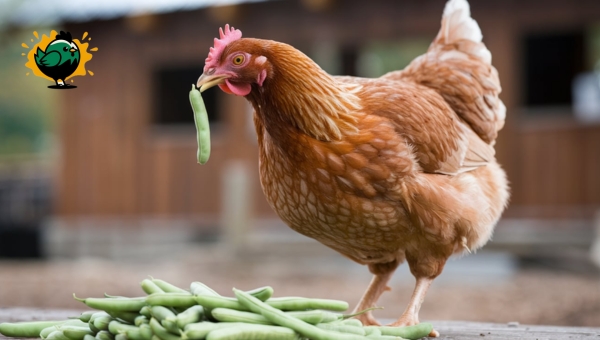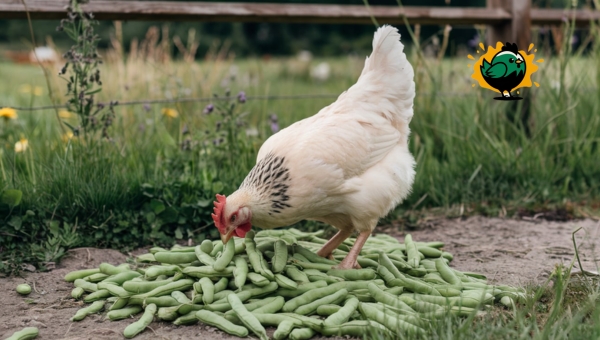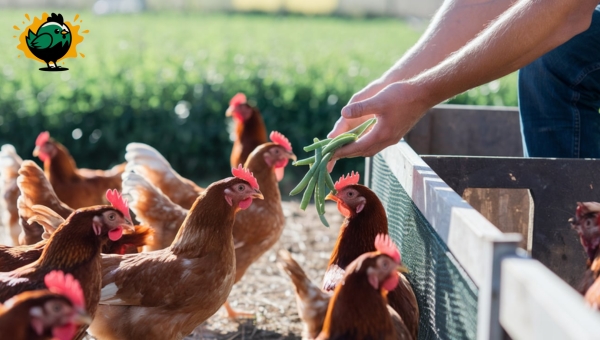Can Chickens Eat Green Beans? Discover the Surprising Truth

If you’re in your backyard, watching your chickens pecking around, and you wonder, “Can chickens eat green beans?” It’s a question many poultry owners have, as they strive to provide their flock with a varied diet. This curiosity often arises while harvesting the garden or sorting through leftovers.
Chickens are known to enjoy various snacks, but not all foods are safe or beneficial for them. In this article, we’ll explore the nutritional benefits, potential risks, and best practices for feeding green beans to chickens. By the end, you’ll have a clear understanding of whether this common vegetable is a suitable addition to your chickens’ diet.
Can Chickens Eat Green Beans: An Overview
Chickens can indeed eat green beans, and they often enjoy this nutritious addition to their diet. Green beans are packed with essential vitamins and minerals, making them a healthy choice for your flock. When introducing green beans to chickens, it’s important to ensure they are fresh and free from any harmful substances.

Green beans can be served either raw or cooked, but always ensure they are chopped into manageable pieces to prevent choking. Avoid seasoning or adding any additional ingredients that could be harmful to chickens. Offering green beans as a treat rather than a staple ensures a balanced diet, contributing to overall health and well-being.
Nutritional Benefits of Green Beans for Chickens
Green beans can be a healthy addition to a chicken’s diet, offering several nutritional benefits. These vegetables are low in calories and packed with essential nutrients that support overall chicken health.

Some key benefits include:
- Vitamins: Green beans are rich in vitamins such as Vitamin A, Vitamin C, and Vitamin K, which play a vital role in maintaining good vision, immune function, and blood clotting.
- Fiber: They provide a good amount of fiber, aiding in digestion and promoting a healthy gut.
- Minerals: Green beans contain important minerals like calcium and iron, which are crucial for bone health and oxygen transport in the blood.
- Antioxidants: These help protect chickens’ cells from damage, supporting their immune system.
Incorporating green beans into a balanced diet can contribute to the well-being of your flock.
Potential Risks and Precautions
Feeding green beans to chickens can be beneficial, but it’s essential to be aware of the potential risks. Understanding these can help ensure that your chickens remain healthy and safe. Let’s explore the concerns of overconsumption and pesticide residue when it comes to feeding green beans to chickens.
Overconsumption Concerns
- Feeding too many green beans to chickens can lead to digestive issues.
- Green beans are low in calories, so they should not replace the main diet of chickens.
- It’s important to offer green beans as a treat rather than a staple food.
- Balance is key to maintaining a healthy diet for chickens.
Pesticide Residue
- Store-bought green beans might contain pesticide residues.
- Washing green beans thoroughly can help reduce pesticide levels.
- Consider buying organic green beans to minimize chemical exposure.
- Always monitor your chickens for any adverse reactions after introducing new foods.
Also Read: Vitamins for Chicken – Boosting Poultry Health
How to Feed Green Beans to Chickens?
Providing green beans to your chickens can be a healthy addition to their diet, but it’s important to understand how best to serve them. The method of preparation and portion sizes play a significant role in ensuring your chickens enjoy the benefits without any adverse effects.
Let’s explore the better option between fresh and cooked green beans and how much and how often you should feed them to your flock.
Fresh vs Cooked
- Fresh Green Beans:
- Offer a crisp texture that chickens may enjoy.
- Retain more nutrients compared to cooked beans.
- Must be washed thoroughly to remove any dirt or chemicals.
- Cooked Green Beans:
- Easier for chickens to digest.
- Less risk of choking or digestive issues.
- Cooking can reduce some nutrients.
Portion Size and Frequency
- Serving Size:
- Aim to provide only a small handful per chicken.
- Serve as a treat, not a primary food source.
- Frequency:
- Offer green beans 1-2 times a week.
- Balance with other foods to ensure a varied diet.
Alternatives to Green Beans for Chickens
Chickens thrive on a diverse diet, and there are numerous alternatives to green beans to keep them healthy and happy.

Here are some options:
- Peas: Packed with vitamins, they are a favorite among chickens.
- Corn: This is a great energy source and is loved by many chickens.
- Carrots: They offer essential nutrients and can be served raw or cooked.
- Lettuce: A hydrating treat, though it should be given in moderation.
- Spinach: High in iron and calcium, but should be mixed with other foods.
- Pumpkin: Rich in vitamins, it can support egg production.
These alternatives ensure chickens receive a balanced diet.
Conclusion
Chickens can indeed eat green beans, and they can be a healthy addition to their diet when given in moderation. Green beans are packed with nutrients that can benefit your flock, including vitamins and minerals. However, it is important to monitor the amount fed to avoid any potential health risks.
Ensuring the beans are free from pesticides and offered in appropriate portions is crucial for maintaining the well-being of your chickens. By providing them with a balanced diet, you can promote their overall health and happiness.
If you found this article helpful, explore more informative posts on our site to enhance your knowledge about chicken care!
